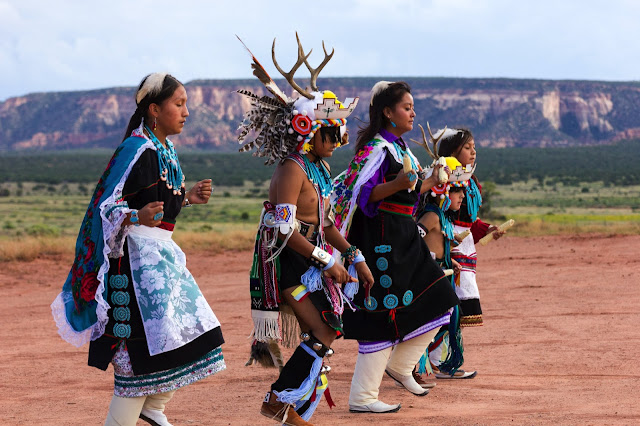South Dakota election scandal: Are Oglala Sioux voting rights doomed?
Published by the Huffington Post in 2010. For more on topics like this, see my book, American Apartheid: The Native American Struggle....
Native Americans have long faced police harassment, illegal voter challenges, and election-day chaos on the way to the polls in South Dakota. Those problems may soon be over on the Oglala Sioux Tribe's Pine Ridge Indian Reservation (shown here). That's because South Dakota has no clear plan to provide any voting at all in this fall's election.
The imminent disenfranchisement of thousands of voters follows resignations of officials from an off-reservation county who handled outsourced, non-tribal government services, including elections, on a freelance basis for Pine Ridge's Shannon County. However, the crisis may also have arisen because Oglalas, members of the nation's most marginalized ethnic group, have emerged as deciders in South Dakota elections -- as have tribes in other areas since 2000, when Native support helped send Washington state's Maria Cantwell to the U.S. Senate. With Shannon County voters turning in the nation's highest Democratic performance in recent presidential elections, sidelining them is a game-changer in close contests, including this year's race for the state's sole Congressional seat, held by Democrat Stephanie Herseth Sandlin.
South Dakota's head election official, Secretary of State Chris Nelson, has taken a hands-off approach to the problem, saying the counties involved should solve it. If they don't, said Attorney General Marty Jackley, who's up for re-election, "the state will weigh the need to take action."
"What if the counties don't work it out? What's the state's plan B?" asked South Dakota Democratic Party head Erin McCarrick. She accused the Republican-controlled state administration, including Nelson and Jackley, of "foot-dragging" as the election gets underway Sept. 20 with early voting. This year, Oglalas had hoped for the full six weeks of this convenient and widely popular type of advance polling. Early voting has seldom been provided in Native communities, but when it has, as many as 46 percent of voters have used it.
Here's the background: As required by Shannon County's charter, its commissioners contract out functions such as collecting taxes, issuing license plates, and running elections to officials of a neighboring district. For years, that district has been Fall River County. Then, during a raucous Sept. 3 meeting, monitored by plainclothes officers sent by Jackley, Fall River officials quit, saying they did so to protest the commissioners firing a sheriff. In giving notice, the officials also demolished Shannon County's government infrastructure. They did not resign from their Fall River posts.
Maybe it's good that somewhere along the line Fall River County lost its AK-47 (a big gun, for those unfamiliar with firearms). "I've looked all over for it," said a departing Fall River official. "Now, I'm not even sure we owned one." Meanwhile, a judge has reinstated the sheriff with a writ of quo warranto (Latin for "who put you in charge?"), an obscure legal maneuver devised in 13th-century England.
Getting back to the 21st century: Secretary of State Nelson says he can't provide a substitute election officer; and he isn't shaking loose Help America Vote Act funds to facilitate a full-fledged Shannon County election. Instead, he's promoting mail-in absentee ballots as a solution.
"Right. Let 'em eat cake," said Greg Lembrich, legal director of nonpartisan voting-rights group, Four Directions, and an attorney at the law firm Pillsbury Winthrop Shaw Pittman. "Folks on reservations don't have easy access to the photocopiers or notaries needed to apply for and complete mail-in ballots."
And there's no election official, so no one to collect and count the ballots, added O.J. Semans, Four Directions' executive director and a Sicangu Lakota from Rosebud Sioux Reservation, also in South Dakota. "Native people aren't asking for anything special here. We just want equal access to voting." He called the commotion over the sheriff a distraction that allowed the state to pull a rabbit out of the hat: Presto, no voting for Oglalas.
South Dakota's own constitution guarantees equal suffrage, Lembrich said. He also pointed to the Voting Rights Act and the U.S. Constitution's 14th Amendment: "It requires states to provide equal protection under the law. It doesn't go on to say, 'unless states delegate authority to counties, in which case the states can wash their hands of the issues.'"
Meanwhile, the U.S. Department of Justice says it's on the case. Last April, DOJ produced a stern document designed to end the mosh pit of Shannon County elections. Among many provisions, poll workers can't make "inappropriate comments" and must provide Lakota-language voting materials when needed.
"That's all irrelevant if it's impossible to vote," said Semans. "And if you don't vote, you don't have a place at the table."
Text and photograph c. Stephanie Woodard.
Text and photograph c. Stephanie Woodard.


